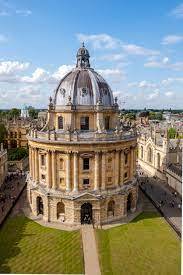The Rhodes Scholarship Committee announced the selection of a recent Georgetown University graduate Nov. 11.
Thomas Batterman (CAS ’22) will join an international cohort of over 100 students — 32 hailing from the United States — to pursue two years of graduate education at Oxford University in the United Kingdom. The scholarship is one of the oldest and most well-known programs in the world, and the thousands of Rhodes Scholar candidates are assessed on factors including excellence in scholarship, commitment to bettering others and their potential to succeed as a leader in their field of choice.
Batterman is the third Georgetown student or alumnus to win the Rhodes in the past two years, after Atharv Gupta (SFS ’23) and Isabella Turilli (SFS ’22) were awarded it last year.
After graduating from Georgetown in 2022 with a major in history and minors in psychology and computer science, Batterman began working to investigate war crimes for the Department of Justice.
Batterman said that after graduation, applying for the Rhodes was not on his radar but that a continued passion for history changed his perspective on the scholarship.

“Up until the beginning of this year I hadn’t planned on applying for the Rhodes, but I think it was the process of naturally becoming passionate about history that opened up more rigorous academic and professional pathways for me,” Batterman wrote to The Hoya.
At Oxford, Batterman plans to pursue masters’ degrees in history of war and late antique and Byzantine studies.
While at Georgetown, Batterman’s honors history thesis earned him the Morris Historical Medal, awarded to the best senior history thesis, for work that centered around an Italian plague in the Middle Ages.
Batterman’s research synthesized a number of literary and biological sources to culminate in a project titled “The Plague That Didn’t Happen: Yersinia Pestis and the Lombard Conquest of Italy” that aimed to reshape the narrative surrounding a plague whose merits scholars had previously debated.
Timothy Newfield, a professor of history at Georgetown and Batterman’s thesis advisor and mentor, said when he first heard about Batterman’s research, he expected high-quality work, but the depth of insight that Batterman provided astonished him.
“I was expecting Tommy to follow the trail back to the early-1900s, perhaps the mid-1800s,” Newfield wrote to The Hoya. “He ended up in the first millennium. Tommy worked up his prize-winning thesis into an academic article shortly after graduating, and, unsurprisingly, it was positively reviewed and is now being published by a major journal in late antique studies this winter.”
Batterman’s attitude and approach to historical studies propelled him toward academic success,
according to Newfield.
“Looking back, I recall him being exceptionally serious about his academics — intensely engaged and exacting on himself, I would say — but only in a very good way. Energy was not wasted and it showed,” Newfield wrote.
According to Lauren Tuckley, director of the Georgetown University Center for Research and Fellowships, Georgetown candidates interested in the Rhodes Scholarship must first undergo an internal application process, and if selected participate in a preparation program.
“After internal review and selection, the nominee class takes part in the CRF’s candidacy development program,” Tuckley wrote to The Hoya. “The development program runs from the end of the spring semester throughout the summer and up until the final interviews take place in November.”
“Throughout this process, nominees meet with the CRF director on a weekly basis to work on deepening their intellectual engagement with their area of interest and to develop their written and oral communication skills,” she added.
Batterman said that although his academic interests were not concrete entering his first year on the Hilltop, an introductory history course shaped his academic trajectory.
“I came to Georgetown undeclared and shopped around a lot for my major, but my first ever history course (a seminar on the history of astronomy) unlocked an unexpected fascination for the subject,” Batterman wrote to The Hoya.
Batterman said that his interests outside of the classroom, though not necessarily related to his field of study, helped to broaden his horizons.
“The same goes for extracurriculars: inside Georgetown I was deeply invested in the music scene, outside of it I was volunteering at the zoo,” Batterman wrote. “Were they relevant to history? At face value probably not. But I think they just made me a more well-rounded person. As Georgetown likes to say: cura personalis.”





















